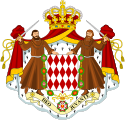| | ||||||||||||||||||||
| ||||||||||||||||||||
All 18 seats in the National Council 10 seats needed for a majority | ||||||||||||||||||||
This lists parties that won seats. See the complete results below.
| ||||||||||||||||||||
 |
|---|
General elections were held in Monaco on 25 February and 3 March 1963. [1] The elections were the first since the promulgation of a new constitution implemented after Prince Rainier III relinquished his absolute rule over the principality, and the first in which women were permitted to vote. [2] The result was a victory for the National and Democratic Union, which won 17 of the 18 seats in the National Council.